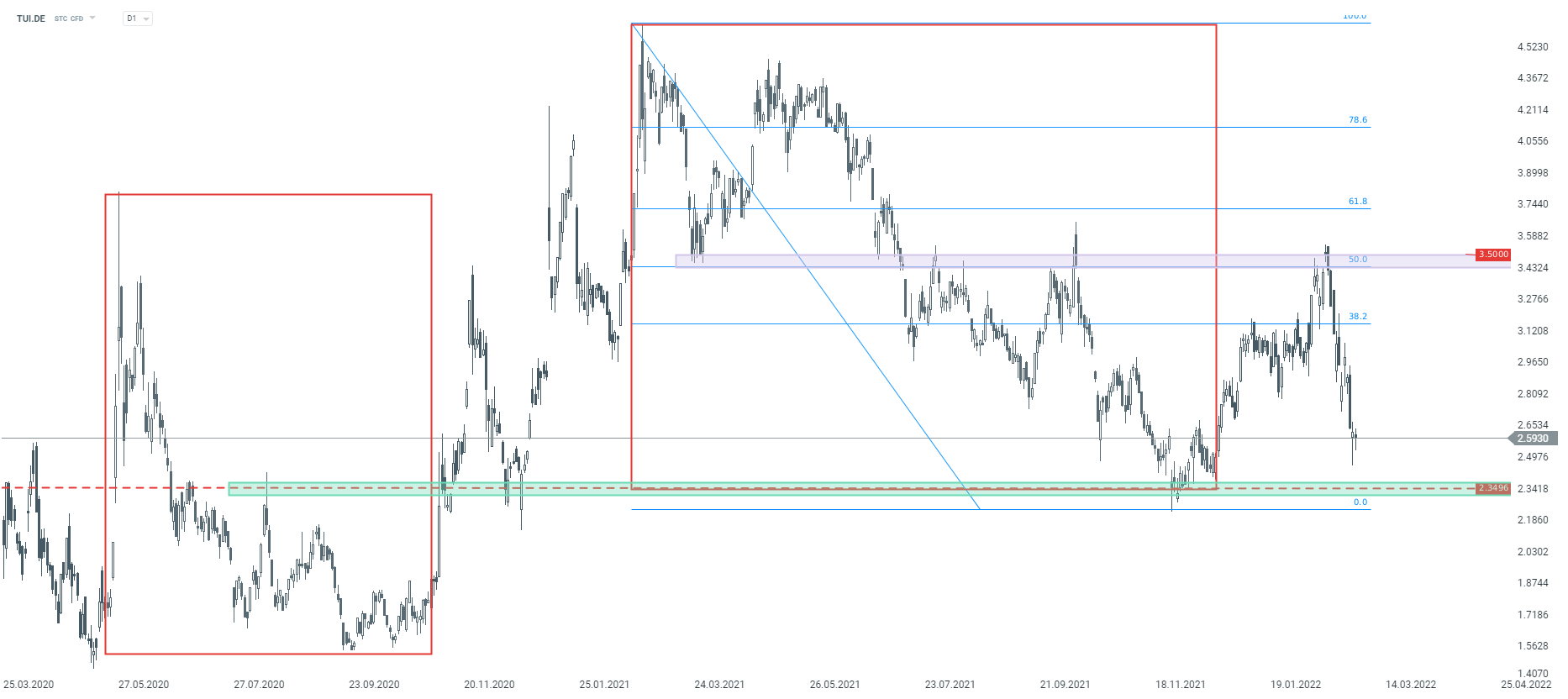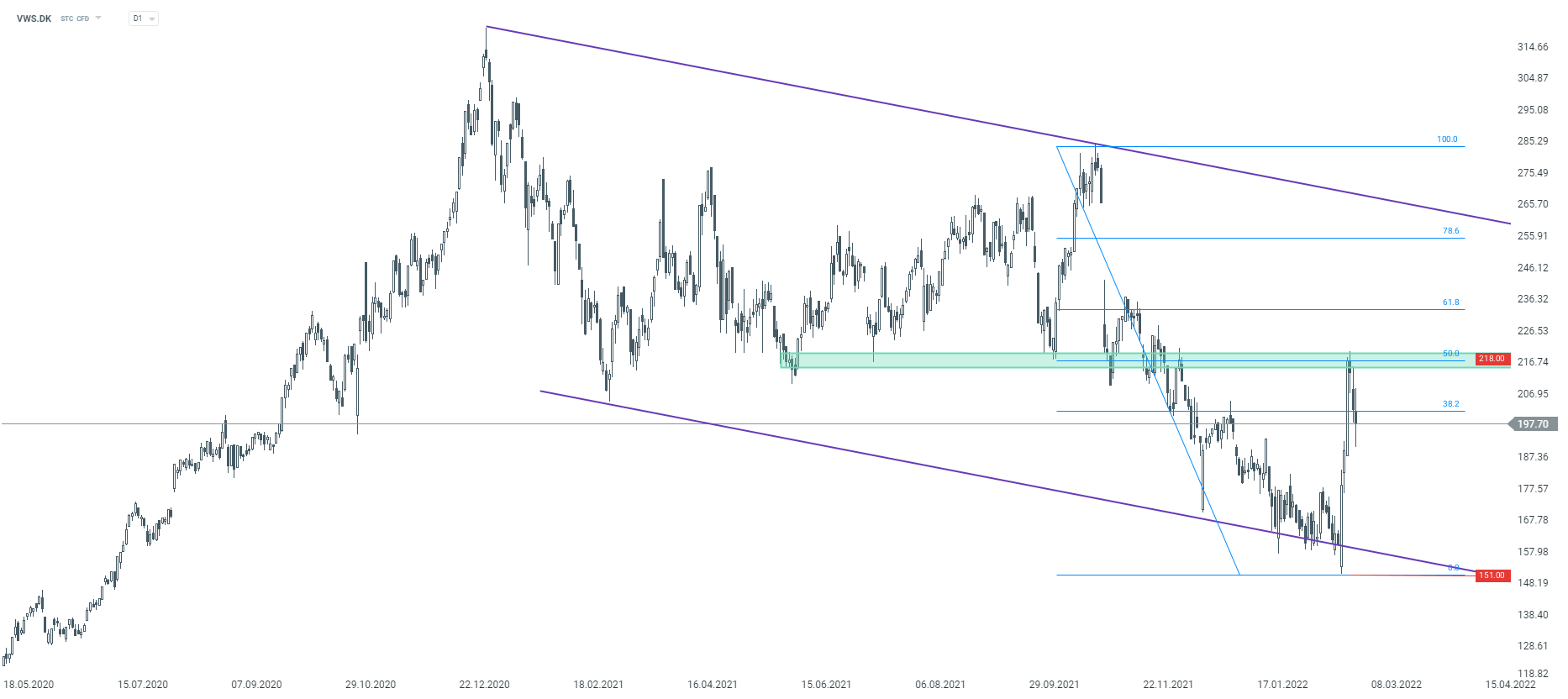-
Western countries hit Russia with far-reaching sanctions
-
Russia retaliates and imposes sanctions on Western world
-
Russian stocks plunge, stock exchange in Moscow closed
-
Banks and airlines among biggest losers
-
Defense companies and new energy technologies stocks benefit
The Russian invasion of Ukraine was an act of aggression not seen in Europe for decades. As it shattered a post-WWII order in the Old Continent by leading to return of violence, countries in Europe and other parts of the World were quick to condemn Russia's actions. Sanctions of unprecedented scale were announced, leading to a shutdown of a stock exchange in Moscow and over-90% plunge in the index of London-listed Russian stocks. However, sanctions on Russia are also having side effects. Let's take a quick look at groups of stocks that can be seen as winners and losers.
Losers
We will start with losers as it is much easier to point out which sectors are losing on sanctions that led to disruptions in international trade and sent shockwaves across financial markets. Among groups of stocks that were the most negatively impacted by sanctions are those that were targeted by sanctions in the first place - financial institutions and airlines. However, the automotive sector is also taking a hit as companies start to self-sanction and halt operations in Russia.
Banks
Sanctions levied upon Russia by the West have to a huge extent cut the country off the international financial markets. While Western countries stopped short of targeting payments for Russian oil and gas flows, major financial institutions from the country were targeted. While this makes it harder for Russian companies to collect payments for their goods and services, it also makes it harder for them to pay for foreign goods and services. This is proving difficult for European banks that not only handle EU-Russia payments but also have big investments in Russia. Share price took a hit reflecting this loss of business and expectation of big portfolio write-downs.
Examples of affected companies: Deutsche Bank (DBK.DE), Societe Generale (GLE.FR) and UniCredit (UCG.IT).
 Deutsche Bank (DBK.DE) is said to have deep ties with its Russian customers, which is reflected in recent performance of the company's share price. Stock dropped below the lower limit of the upward channel and reached the lowest level since late-September 2021. Source: xStation5
Deutsche Bank (DBK.DE) is said to have deep ties with its Russian customers, which is reflected in recent performance of the company's share price. Stock dropped below the lower limit of the upward channel and reached the lowest level since late-September 2021. Source: xStation5
Automotive Sector
Carmakers and other companies in the automotive sector are also heavily impacted by war in Ukraine. Supply chain disruptions led to parts shortages. German carmakers, like BMW, announced that they will have to halt production at some of their domestic factories as assembly cannot continue amid lack of part from Ukraine. Tire companies are also taking a hit as the industry's raw material supply from Russia was impacted. Finally, a growing public backlash against those that do business with Russia caused some companies to self-sanction and impose restrictions beyond official ones, like for example Volkswagen halting exports and sales in Russia.
Examples of affected companies: Renault (RNO.FR), Volkswagen (VOW1.DE), Continental (CON.DE) and BMW (BMW.DE).
 Russia is the second largest market for Renault (RNO.FR). Share price of the French carmaker plunged over 30% since the launch of Russian invasion as investors fear the company will soon be unable to conduct business in Russia at all. Source: xStation5
Russia is the second largest market for Renault (RNO.FR). Share price of the French carmaker plunged over 30% since the launch of Russian invasion as investors fear the company will soon be unable to conduct business in Russia at all. Source: xStation5
Airlines and Aviation Sector
The European Union, the United States, Canada, the United Kingdom and more decided to close airspace over their territories for Russian aircraft. As a result, Russian airlines were forced to take longer routes or abandon some connections altogether as they were no longer profitable. Russia has quickly retaliated in a similar manner, making it much more difficult for European airlines, like Lufthansa, to reach Asia. Carriers with significant operations in Eastern Europe, like TUI, were heavily impacted as well. While sanctions are expected to be more painful for Russian companies, European and US companies will also suffer business loss - Airbus and Boeing already announced that they will no longer provide support services and spare part supply to Russian airlines.
Examples of affected companies: Lufthansa (LHA.DE), TUI (TUI.DE), Airbus (AIR.DE), Boeing (BA.US).
 Central and Eastern Europe is an important business region for European low-cost carrier TUI (TUI.DE). Even as the company's valuation remains depressed in the aftermath of Covid-19 pandemic, stock took another 25% hit over the past week and a retest of late-November 2021 lows cannot be ruled out. Source: xStation5
Central and Eastern Europe is an important business region for European low-cost carrier TUI (TUI.DE). Even as the company's valuation remains depressed in the aftermath of Covid-19 pandemic, stock took another 25% hit over the past week and a retest of late-November 2021 lows cannot be ruled out. Source: xStation5
Winners
Size of the Russian economy and deep trading ties with numerous European countries cause Russian sanctions to have a significant negative impact on some US and European companies. However, there are also groups of stocks that benefit from the situation or, more precisely, from change in the global order. Countries that did not see the need to spend big on defense have changed their minds while those dependent on Russian energy supply started to look elsewhere.
New Energy Technologies
Europe's high dependence on Russian energy imports has made imposing effective sanctions hard. While the EU and its allies target a big part of the Russian economy, they stayed shy of targeting the Russian energy sector out of fear that Russia will retaliate by halting energy exports completely. This could trigger an energy crisis in Europe but is also encouraging leaders to look for energy supply elsewhere. Calls to slow down German nuclear exit or halt ETS were made. No clear decisions were made yet but it looks highly probable that the EU will look towards renewable energy, nuclear power or hydrogen as ways to replace Russian oil and gas, what could prove to be an opportunity for companies operating in those sectors.
Examples of affected companies: Vestas Wind Systems (VWS.DK), Orsted (ORSTED.DK), NEL (NEL.NO) and Uranium Energy (UEC.US)
 Vestas Wind Systems (VWS.DK) gained as it became obvious that Europe will work to lower its dependency on Russian energy commodities. Demand for renewable energy systems in Europe is expected to increase in the aftermath of the Russian invasion. Stock bounced off the lower limit of the downward channel and is looking towards a test of the upper limit. Source: xStation5
Vestas Wind Systems (VWS.DK) gained as it became obvious that Europe will work to lower its dependency on Russian energy commodities. Demand for renewable energy systems in Europe is expected to increase in the aftermath of the Russian invasion. Stock bounced off the lower limit of the downward channel and is looking towards a test of the upper limit. Source: xStation5
Defense Sector
Russian invasion of Ukraine not only means that war has returned to Europe. It also means that military race between global superpowers will resume. As NATO countries saw Russian aggression towards Ukraine as a direct threat to the alliance, member countries announced that they will spend more on defense. German Chancellor Scholz said that €100 billion will be spent on the German military to compensate for below-target investments in previous years. It is also expected that other NATO countries will boost spending to be in compliance with a NATO-wide target of 2% of GDP. Defense companies from Europe and the United States alike gained this week as politicians from Europe and the United States called to increase military spending.
Examples of affected companies: Rheinmetall (RHM.DE), BAE Systems (BA.UK), Raytheon Technologies (RTX.US) and Lockheed Martin (LMT.US).
 Launch of Russian invasion and resulting expectations of increased defense spending allowed share of Lockheed Martin (LMT.US) to break above pre-pandemic highs and reach new record highs. Lockheed Martin is an important US government contract that has been supplying US Army with military aircraft and other equipment for a long time. Source: xStation5
Launch of Russian invasion and resulting expectations of increased defense spending allowed share of Lockheed Martin (LMT.US) to break above pre-pandemic highs and reach new record highs. Lockheed Martin is an important US government contract that has been supplying US Army with military aircraft and other equipment for a long time. Source: xStation5

Politics batter the UK bond market once more, as Starmer remains under pressure

STM is growing stronger thanks to a new partnership with AWS!

The Week Ahead

Kongsberg Gruppen after earnings: The company catches up with the sector
This content has been created by XTB S.A. This service is provided by XTB S.A., with its registered office in Warsaw, at Prosta 67, 00-838 Warsaw, Poland, entered in the register of entrepreneurs of the National Court Register (Krajowy Rejestr Sądowy) conducted by District Court for the Capital City of Warsaw, XII Commercial Division of the National Court Register under KRS number 0000217580, REGON number 015803782 and Tax Identification Number (NIP) 527-24-43-955, with the fully paid up share capital in the amount of PLN 5.869.181,75. XTB S.A. conducts brokerage activities on the basis of the license granted by Polish Securities and Exchange Commission on 8th November 2005 No. DDM-M-4021-57-1/2005 and is supervised by Polish Supervision Authority.


